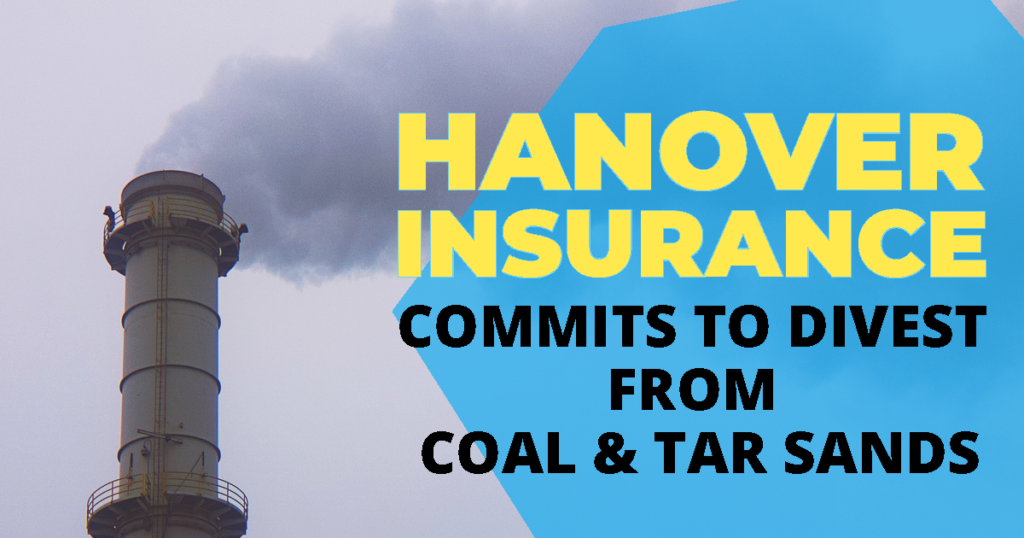
Hanover’s Announcement Increases Pressure on U.S. Insurance Laggards to Act on Climate
By Elana Sulakshana (@esulakshana), Energy Finance Campaigner, Rainforest Action Network
The Hanover Insurance Group recently updated Environmental, Social and Governance framework and committed to cease new investments in many coal and tar sands companies and partly divest from these sectors by 2025.
The Massachusetts-based property and casualty insurer is joining a global movement of insurers that are shifting capital out of coal and tar sands. To date, sixty-plus major insurers have adopted policies restricting coal investments, and more than a dozen of those have also limited tar sands investments.
The Hanover’s policy was updated in the midst of mounting pressure on insurers to take bold action for a safe and habitable planet for all. This would not have happened without the countless activists who are taking to the streets demanding action from Wall Street, First Nations and Indigenous rights advocates that are holding insurance companies accountable for backing Indigenous rights violations, and institutional customers like municipalities and businesses that are cutting ties with fossil insurers that continue to dither in the face of the climate crisis.
Hanover’s policy is a critical first step towards decarbonizing its investment portfolios and adds to the tally of U.S. insurers that are starting to get with the program of climate action. The announcement increases pressure on fellow U.S. insurers AIG, Travelers, and Berkshire Hathaway, as all three companies currently have zero policies restricting fossil fuel investments or insurance services. Hanover’s policy also sets the bar higher than the handful of U.S. insurers that have coal divestment commitments that are riddled with loopholes, including Liberty Mutual and MetLife.
However, The Hanover’s policy is not best practice globally, as it falls short in a few key ways. It relies on incomplete definitions of coal and tar sands companies, and unlike leading European insurance peers, it does not set out a plan to fully exit those two sectors. Furthermore, coal and tar sands are just the tip of the iceberg. The science is clear that we cannot build any new fuel infrastructure to stay within a safe climate limit, so that means The Hanover must expand its policy to encompass investing and insuring all types of oil and gas.
BACKGROUND ON THE HANOVER
The Hanover Insurance Group (NYSE: THG), based in Worcester, Massachusetts, is the holding company for several property and casualty insurance companies that offer insurance for automobiles, homes, and small and mid-sized businesses. Together, these companies make up one of the largest property and casualty insurance businesses in the US. At the end of 2019, the company’s assets totaled nearly $12.5 billion, and it brought in $4.6 billion in premiums in that year alone.
HOW DOES THE POLICY STACK UP?
With its new policy, The Hanover has pledged to cease new investments in companies that will rely on coal for more than 25% of their electricity generation in 2025, will generate more than 25% of their revenue from mining or processing coal by 2025, or currently have plans to develop new coal mining or power infrastructure. Additionally, The Hanover will not invest in companies that will have more than 25% of their reserves in tar sands or will generate more than 25% of their revenue from shipping tar sands after 2025. Investments in companies that exceed these thresholds will be phased out by 2025.
While the inclusion of coal expansion criteria is worthy of applause and the policy overall is stronger than some of the commitments from US insurers, it has major loopholes, and many of The Hanover’s global peers are taking much more ambitious steps to phase out fossil fuels from their business.
Here’s my take:
- Coal: The Hanover’s thresholds to define a coal company and nonexistent plan to strengthen this definition over time is concerning. The Global Coal Exit List (GCEL) currently defines coal companies as those that have more than a 20% share of coal for power generation and revenue, and by 2025, which is the grace period that this policy offers, GCEL will have lowered that threshold. The Hanover must commit to revisiting the policy and lowering these relative thresholds to zero to support a full exit from coal by 2030 in OECD/European countries and by 2040 at the latest elsewhere.
Additionally, GCEL defines coal companies using thresholds for absolute coal mined (>10 million tonnes) or combusted (>5 gigawatts), which The Hanover does not include. This means that large diversified companies that are mining or combusting massive quantities of coal are not included in scope.
On a positive note, the inclusion of expansion criteria for coal companies is very significant, as it marks the first major US financial institution (not just insurer) to exclude companies that are building or planning new coal mines or power plants or other coal infrastructure, which is another GCEL criterion. This must be a standard for all coal policies, as there are hundreds of coal mines and power plants in the planning and building stages right now. In fact, 101 companies that fall under the 25% revenue threshold for coal mining still have plans to build new mines.
- Tar Sands: The restrictions on tar sands extraction and transport companies is a welcome addition, given the grave risks to Indigenous rights, local ecosystems, and the climate that tar sands mines and pipelines pose. Unlike The Hartford and MetLife, this policy addresses the tar sands supply chain beyond the point of extraction. However, to fully exit the destructive tar sands sector, The Hanover must also set out a plan to tighten the tar sands company thresholds and include expansion criteria akin to the coal company definition.
- Oil and Gas: The Hanover’s policy does not address oil and gas companies beyond tar sands. This means that it can continue to invest freely in companies expanding oil and gas infrastructure, including fracking, offshore drilling, and pipelines. The Hanover and its subsidiaries had more than $772 million invested in oil, gas, and utilities, according to 2017 data from the California Department of Insurance.
The Hanover also insures oil and gas projects and companies, particularly in its marine division, and so any policy on oil and gas must be applied across all business areas and address underwriting as well.
- Third-Party Assets: A major loophole is that this policy only applies to assets that are internally managed via Opus Management, The Hanover’s investment arm. The portfolios that Opus manages for institutional clients appear to be able to continue investing in coal and tar sands companies with no restrictions.
- Indigenous Rights: The Hanover also sets out new investment guidelines that are related to “Social” issues but does not include companies’ approaches to human and/or Indigenous Peoples’ rights as an investment factor. The Hanover should commit to not invest or insure companies that seek to build projects without the Free, Prior, and Informed Consent of impacted Indigenous Peoples globally, as articulated in the United Nations Declaration on the Rights of Indigenous Peoples.
For a summary of this analysis and to compare Hanover’s commitments alongside those of global financial institutions, check out Reclaim Finance’s Coal Policy Tool.
LOOKING AHEAD
We welcome The Hanover’s updated policy – which is much stronger than the previous iteration that had no exclusionary components – but we will continue to urge The Hanover to step up its ambition and divest from all coal, oil, and gas companies that are not aligned with a 1.5ºC scenario, phase out insurance for oil and gas companies and projects, and commit to respect human rights. The Hanover has the opportunity to lead the US insurance industry in accelerating a just, low-carbon energy transition globally.
Follow us on Twitter @Insure_Future and contact Sulakshana at sulakshana@ran.org for more information or to arrange a meeting with our team.



